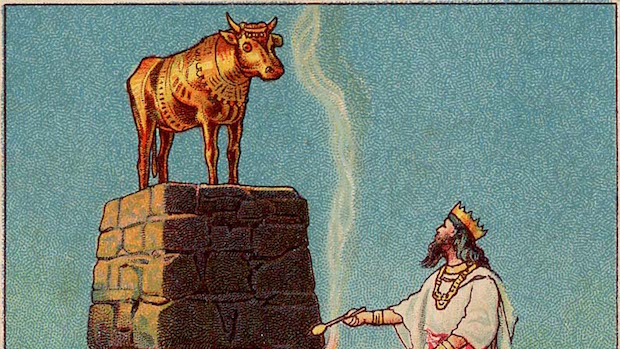Hezekiah is affirmed in Scripture as doing “what was right in the Lord’s sight” (2 Kings 18:3). The next verse details what Hezekiah did: “He removed the high places, shattered the sacred pillars, and cut down the Asherah poles. He broke into pieces the bronze snake that Moses made, for the Israelites burned incense to it up to that time” (2 Kings 18:4).
Surely people understood a strong, spiritual leader removing the idols (the high places and the Asherah poles) that grabbed the hearts of the people and stole worship from the Lord. They would expect their spiritual leader to insist they stop worshiping other gods. But what Hezekiah did next must have been really unexpected and really controversial. He broke into pieces the bronze snake Moses made—intentionally. Not by accident. Not “I was carrying it and it fell.” To break bronze takes some effort.
Eliminating pagan idols is one thing, but “that was the snake Moses made!” It was the bronze snake God told Moses to make, the one people looked at to be delivered from their snakebites (Numbers 21).
Hezekiah broke the snake because the people were burning incense to it. They were worshiping a bronze snake. Tools for transformation can become objects of worship. In our sinfulness, we can make an idol of just about anything. In our sinfulness, we tend to make idols of things that are important to us. Thus, a bronze snake that God used to bring healing, held by the leader of God’s people during their liberation from slavery, became an object of worship.
Today is not altogether different. God’s people still struggle with taking tools for transformation and making them objects of worship. Here are three common idols in churches:
1. The Place
Because the Lord does a great work in the hearts of His people when they gather, the places of gathering can move from a tool for transformation to an object of worship. Thus, if a leader mentions “relocation,” the leader is essentially threatening to cut a bronze snake into pieces. We must remind people that the building is not the Church, that His people are the Church. God does not live in the place where we gather; He lives in the hearts of His people.
2. The Past
Because the Lord worked in amazing ways in the past, the past can become an idol where people long for the past more than they long for the Lord. Being grateful for the past is one thing, and worshiping it is quite another. If “former days” were great, they were only great because of the Lord.
3. The Programs
Because God changed lives through a program or event, people can elevate a program to an unhealthy place. Programs can become ends in themselves and not tools used in a church’s discipleship process. When this happens, they exist as modern-day bronze snakes.
How can leaders be like Hezekiah? How can modern-day bronze snakes be removed?
Leaders must constantly point people to the person of Jesus. Only He is worthy of our worship and only He can transform hearts. When we help people see the greatness of Jesus, idols look less attractive. As we turn our eyes on Jesus and look full in His wonderful face, the things of this world (place, past, and programs included) grow strangely dim in the light of His glory and grace.
Leaders must also continually remind people of the purpose of the Church. (Yes, I know it is another “p,” but it fits.) A church exists to make disciples. When a church embraces the mission of making disciples, programs are viewed as tools and not as ends in themselves. When making disciples is what a church is all about, the place is rightly seen as merely a place to help make disciples.
Though the Lord instructed the snake to be made, the Lord affirmed its destruction. And of Hezekiah, the Scripture says:
Hezekiah trusted in the Lord God of Israel; not one of the kings of Judah was like him, either before him or after him (2 Kings 18:5).






